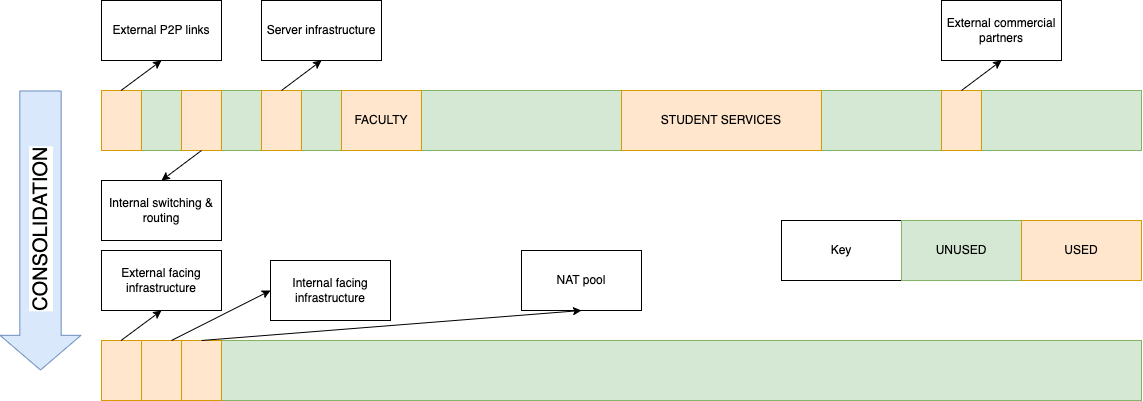Unused Assets
at UK & Irish Universities
by Leo Vegoda & Linda Shannon

Many UK and Irish universities are sitting on untapped, very liquid assets. This asset type is often unused or replaceable with free resources while being very valuable to others. Sale prices can run into the millions.
IP addresses are the numbers designating devices on the internet. Unique IP addresses identify the end points of traffic crossing the internet. And as the internet started in educational institutions, they got large blocks of addresses.
Many higher educational institutions received large numbers of IPv4 addresses – the first widely deployed version. Early technical limitations meant they often got many more than they needed then or now. These addresses – free at the time – are now traded between $30 and $50 per address. That’s between £24 and £40.
At the top end of that range, a large block of addresses brings its seller £2.6 million.
The Financial Issue
Educational institutions in the UK and elsewhere are under significant financial pressure. Tuition fee caps have not changed since 2012 but the Office of National Statistics reports CPI inflation of 33 percent since then.
Times Higher Education (THE) reported in January that “Nearly half of UK vice-chancellors expect their university to be in financial deficit this year”. Of course, staffing costs are a key factor with 27 percent of schools telling THE that they were considering personnel cuts. Another 23 percent were considering changing staff-to-student ratios.
What Can We Sell?
IPv4 addresses were created when computing was slow and expensive. This meant there were relatively few computing devices on most networks and relatively few networks. The organizers of the system designed a straightforward way of dealing with the needs of small, medium and large networks.
They simplified address management by grouping them in blocks of addresses allocated to independent networks. The best-known of these methods was called classful routing. It used the small, medium, and large approach to bundles of addresses:
- Small networks got 256 addresses – a Class C
- Medium networks got 65,526 addresses – a Class B
- Large networks got 16 million addresses – a Class A
Since the addresses seemed plentiful at the time (there are four billion of them) there didn’t appear to be a need to ration carefully. And, certainly no need to give fewer than requested to any educational institution. So, a network that appeared to need 5,000 addresses now or sometime in the near future (that is, 20 or so Class Cs) were given a Class B instead. So, a school needing 5,000 addresses got 65,536. Many still have them all, largely unused.
Put simply, even with organizational growth, many institutions have a lot of unused addresses.
Even more impactful for higher education, IPv4 is not the only game in town anymore. A subsequent system, called IPv6, is widely used.
The Internet Society reports that almost half of the top 1,000 websites support IPv6. 45 percent of traffic to Google was IPv6 at the end of February 2024. It is clearly a protocol that is available and growing. Best of all, there is no shortage of IPv6 address space. This releases valuable IPv4 addresses to the transfer market, providing a cash infusion to those who sell those they don’t need.
Asset Types
Many UK and Irish universities believe they do not “own” and cannot transfer for payment the IPv4 addresses they have. This belief stems from the assumption that Jisc or HEAnet (the national research and education networks) have claim to them. In most cases, this is incorrect. Following many inquiries, Jisc has answered the question of what kind of addresses UK colleges and universities have and what their rights to them are. Simply put: UK universities and colleges have the right to sell their addresses through the IPv4 transfer market.
- Legacy – these are addresses that were handed out without any requirement to pay for use. They are available for transfer and often command a premium on the market.
- Provider Aggregated – When they are ‘allocated’ to the institution by the RIPE NCC the educational institution owns them. They are only owned by Jisc if they are ‘assigned’ to the institution by Jisc. This distinction is discoverable as described below.
- Provider Independent – these are addresses handed directly to the institution. They are available for transfer.
In most cases, Jisc acts as the Local Internet Registry for the institutions. This means that they maintain the relevant database entries at the RIPE NCC. The RIPE NCC is where the addresses are registered. Its database shows who is using addresses and how to contact them when trying to resolve technical issues.
Jisc limits itself to acting as a center of expertise. It can offer advice but educational institutions get to decide whether to sell their IPv4 assets. You can sell your addresses on the transfer market as long as they aren’t assigned by Jisc.
What Can I Do?
It’s good to regularly review your assets. If you’re considering liquidating your IPv4 address holdings for cash, these are the steps you need to take. (Note that help is available to you to accomplish these tasks. More on that at the end of this blog.)
Check What’s Yours
You can sell what is directly allocated to your institution. To discover that fact, go to the RIPE NCC website. Check that the “org:” for the IPv4 addresses your institution uses. Then select an inverse query and filter for “inetnum:” type objects.

RIPE Database query for inetnums (IPv4 address space) allocated to the RIPE NCC
You can get the same results on a command line. Just add your ORG at the end of this command:
$ whois -h whois.ripe.net — -r -Tinetnum -iorg YOUR-ORG-HERE
Check the status. If the status is “LEGACY” it can have additional value to some buyers. That status can be transferred and allows the holder of the address space to get basic services for free.
Check What’s Unused
Check how much address space is not used on your network. In many cases you could sell those unused addresses separately. But larger blocks are more attractive, so the next step is to look at where your network uses IPv4 addresses in ways that aren’t needed. Note that the assignment of addresses to various parts of a network, especially if that network grew over time, can be somewhat chaotic. That disorder can be remedied so that unused blocks can be sold.
Other addresses can be made available in other ways. One example is guest LANs. These can often be replaced with IPv6, or with private IPv4 addresses and NAT.
Reorganize
Consider reorganizing the addresses used on your network, so you free up a large contiguous range. Larger blocks get better prices.

Example of a large block of addresses with patches of unused space. Reorganizing the address distribution can free up large, contiguous blocks for the transfer market.
Go To Market
IPv4.Global operates the world’s largest and most transparent auction platform. That means we show the sale prices for past transactions, giving you an insight into what is possible. But we can also negotiate private sales. If you have a very large amount of space to sell or want to exchange a large block for a smaller block, a private sale might be right for you.
IPv4.Global Can Help
We can help throughout your process.
- We can help you research what address space is allocated to your institution and help you determine what, if any of it can be sold.
- We can help you free space for resale by providing technical expertise to update your network.
- And we run the world’s most trusted and transparent auction platform.
Contact IPv4.Global at info@ipv4.global and one of our local experts can be your guide. If you’d like, contact Linda Shannon, Hilco Streambank Europe, lshannon@hilcoglobal.eu, +44 7718 424 451.